Two rules should help the non-Donizettian: avoid all stagings of the prolific Bergamasco's nearly 70 operas other than the comedies; and seek the guarantee of top bel canto stylists. Conductor Mark Elder and soprano Joyce El-Khoury certainly fit that bill, and a straight concert performance of L'Ange de Nisida, given at the Royal Opera in association with Opera Rara, got it exactly right. You had to credit the hard work of reconstruction, too, on this opera semiseria which never reached the stage but was expanded, with a similar plot line and several of the same characters, as the relatively familiar La Favorite.
The essence gives a slight kick to the Italian-opera love triangle: the church's intervention in the Neapolitan King's pursuit of his Spanish mistress Sylvia, secluded on a small island near Naples where the people love her angelic benificence, initiates a marriage of convenience to get her out of a difficult situation - but it's with the man she loves, and he doesn't know the nature of the set-up. 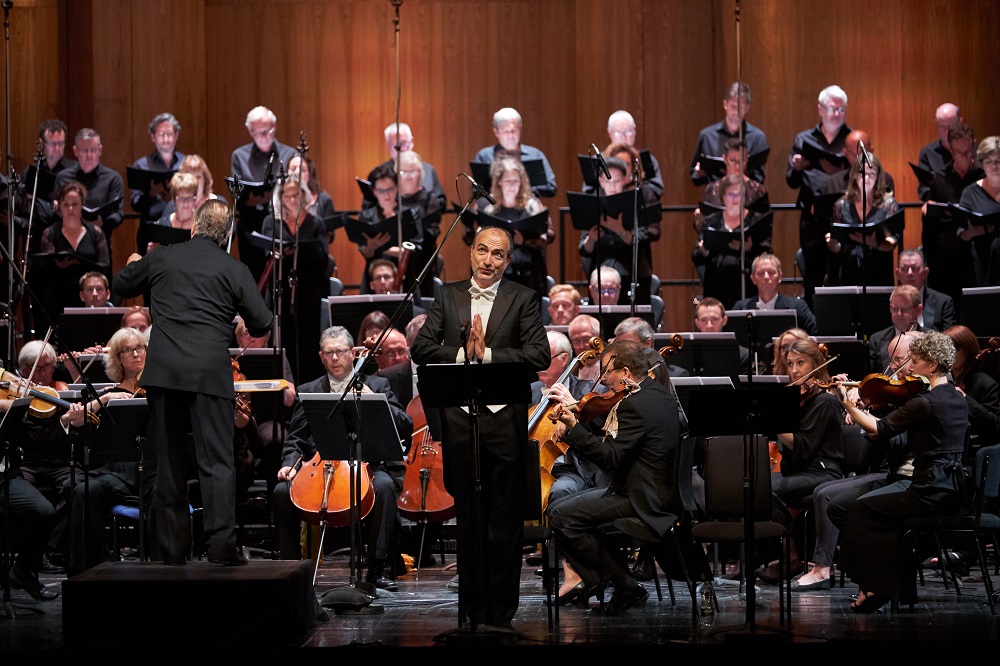 For three-quarters of an undemanding but classy journey last night, the musical if not the dramatic pleasures are more than intermittent. It helps that, while complex characterisation isn't an option, Donizetti gives each of his five characters and the chorus distinctive music, and that here the casting was perfect. Most durable, for those of us who prefer the likes of L'elisir d'amore, Don Pasquale and La Fille du regiment (contemporary with L'Ange) to the operas with tragic endings, was the role of court manipulator Don Gaspar, taken in perfect buffo/bouffe style by the ever-charismatic Laurent Naouri (pictured above). His Act Three duet with his King - sung with ideal authority by Vito Priante - was a rollicking highlight.
For three-quarters of an undemanding but classy journey last night, the musical if not the dramatic pleasures are more than intermittent. It helps that, while complex characterisation isn't an option, Donizetti gives each of his five characters and the chorus distinctive music, and that here the casting was perfect. Most durable, for those of us who prefer the likes of L'elisir d'amore, Don Pasquale and La Fille du regiment (contemporary with L'Ange) to the operas with tragic endings, was the role of court manipulator Don Gaspar, taken in perfect buffo/bouffe style by the ever-charismatic Laurent Naouri (pictured above). His Act Three duet with his King - sung with ideal authority by Vito Priante - was a rollicking highlight.
So, too, was the slow cantabile of Sylvia's aria which immediately follows, beautifully phrased by El-Khoury (pictured below with Priante and Elder). She was not on her best form, though, for the cabaletta, with occasional cloudiness in the upper register getting in the way of a seamless whole. The show-off triumph of the evening belonged to Korean tenor David Junghoon Kim. Musicality and the high notes just pour out of him, and his sensitivity in plangent moments was authentically Italianate, too. 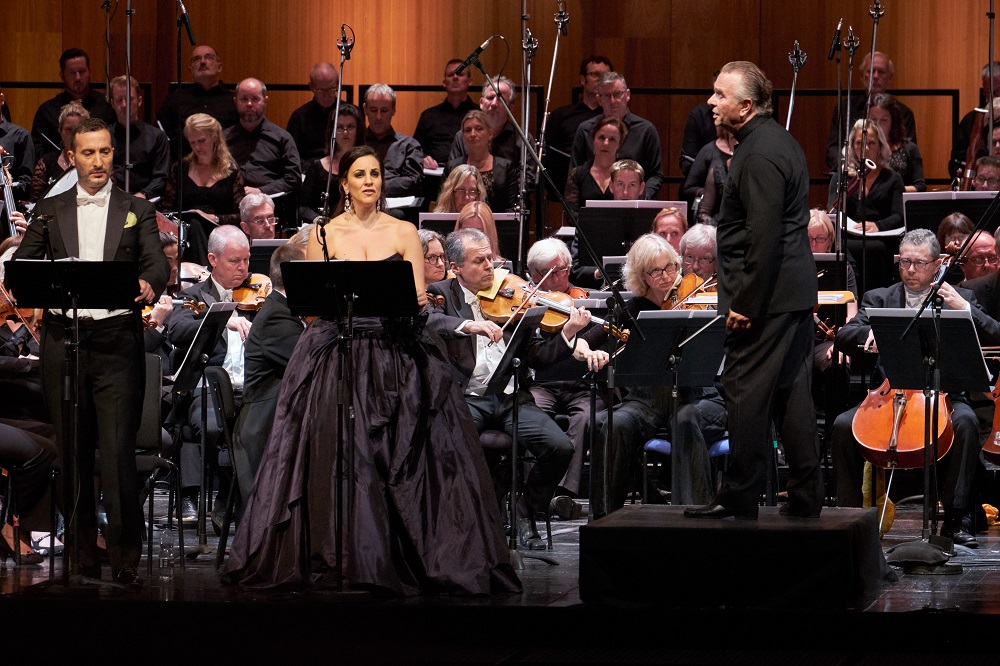 Elsewhere, Donizetti's originality flashes in tripping chorus, ensembles and some of the orchestral rejoinders in the recitative. There are even some felicitous touches of orchestration, like the woodwind for Leone's opening serenade and a mournful pair of horns, superb singers both. The religious music which accompanies the Monk - Russian Evgeny Stavinsky, a fifth nationality in a world-class line-up - moves from trombone-heavy threats, a new element in the early scenes, to cowled colours in the cloister. Would that the sudden seriousness of the lovers' music there, ending in a quite unnecessary death, was up to the mark. Donizetti seemed to like it enough to carry it through wholesale to La Favorite, but how we miss the lightness of earlier scenes.
Elsewhere, Donizetti's originality flashes in tripping chorus, ensembles and some of the orchestral rejoinders in the recitative. There are even some felicitous touches of orchestration, like the woodwind for Leone's opening serenade and a mournful pair of horns, superb singers both. The religious music which accompanies the Monk - Russian Evgeny Stavinsky, a fifth nationality in a world-class line-up - moves from trombone-heavy threats, a new element in the early scenes, to cowled colours in the cloister. Would that the sudden seriousness of the lovers' music there, ending in a quite unnecessary death, was up to the mark. Donizetti seemed to like it enough to carry it through wholesale to La Favorite, but how we miss the lightness of earlier scenes.
Elder, all the same, is spruce and supportive to his singers from first note to last, saving us from any sense of longueurs in what is, mercifully, a shorter opera than the baggy monster into which Donizetti transformed it. The Opera Rara recording based on these performances will certainly be a worthwhile addition to the Donizetti discography. 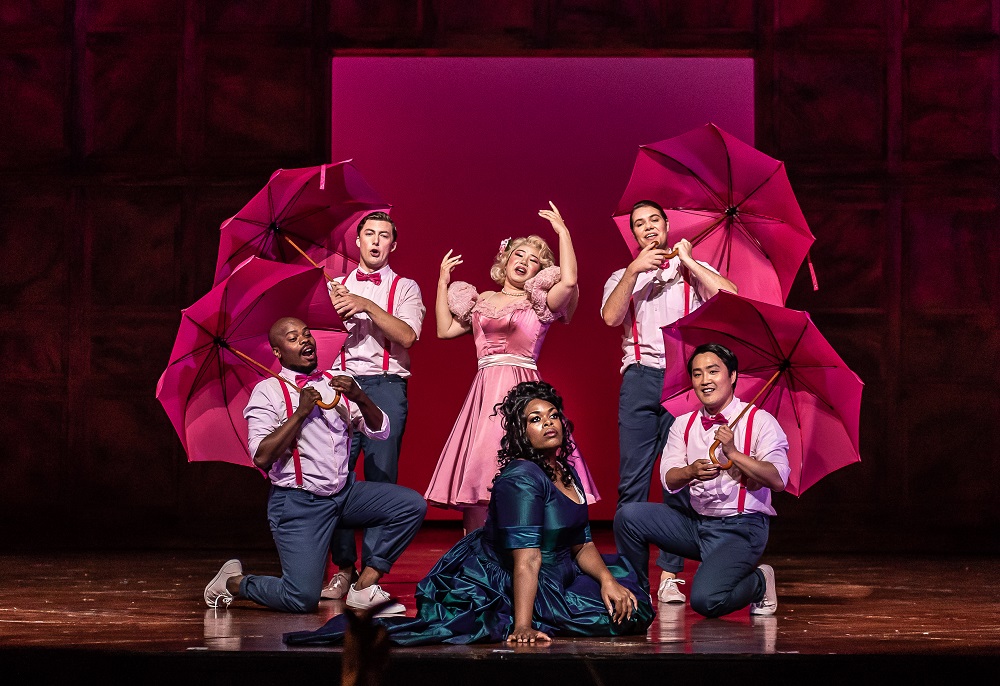 Junghoon Kim is one of many brilliant graduates of the Jette Parker Young Artists Programme at the Royal Opera. In their annual showcase on Sunday afternoon another Korean tenor, Konu Kim, showed a lovable personality in excerpts from Strauss's Ariadne auf Naxos - would that the conducting, of a surprising lumpiness from a big name, Jac van Steen, had served the dance-scene better - and the fizzing, onomatopoeic Act 1 finale of Rossini's L'Italiana in Algeri, the most successful staging in JPYAP producer Noa Naamat's armoury. (Kim pictured above on the right by Clive Barda with Simon Shibambu, Dominic Sedgwick, Haegee Lee, Sarah-Jane Lewis and Thomas Atkins)
Junghoon Kim is one of many brilliant graduates of the Jette Parker Young Artists Programme at the Royal Opera. In their annual showcase on Sunday afternoon another Korean tenor, Konu Kim, showed a lovable personality in excerpts from Strauss's Ariadne auf Naxos - would that the conducting, of a surprising lumpiness from a big name, Jac van Steen, had served the dance-scene better - and the fizzing, onomatopoeic Act 1 finale of Rossini's L'Italiana in Algeri, the most successful staging in JPYAP producer Noa Naamat's armoury. (Kim pictured above on the right by Clive Barda with Simon Shibambu, Dominic Sedgwick, Haegee Lee, Sarah-Jane Lewis and Thomas Atkins)
Naamat also took advantage of the lack of epilogue to Stravinsky's The Rake's Progress to give mad Tom Rakewell a suicide that turns into a slow, ever-brighter release from earthly cares. Thomas Atkins's characterisation was another highlight, with the right heartbreak from the last visit to Bedlam of Anne Trulove, poignantly sung by the ever radiant and characterful Francesca Chiejina. In an excerpt from Thomas's fitfully interesting Hamlet, superbly conducted by JPYAP repetiteur James Hendry, Jacquelyn Stucker (pictured below by Clive Barda) briefly amazed as Ophelia. 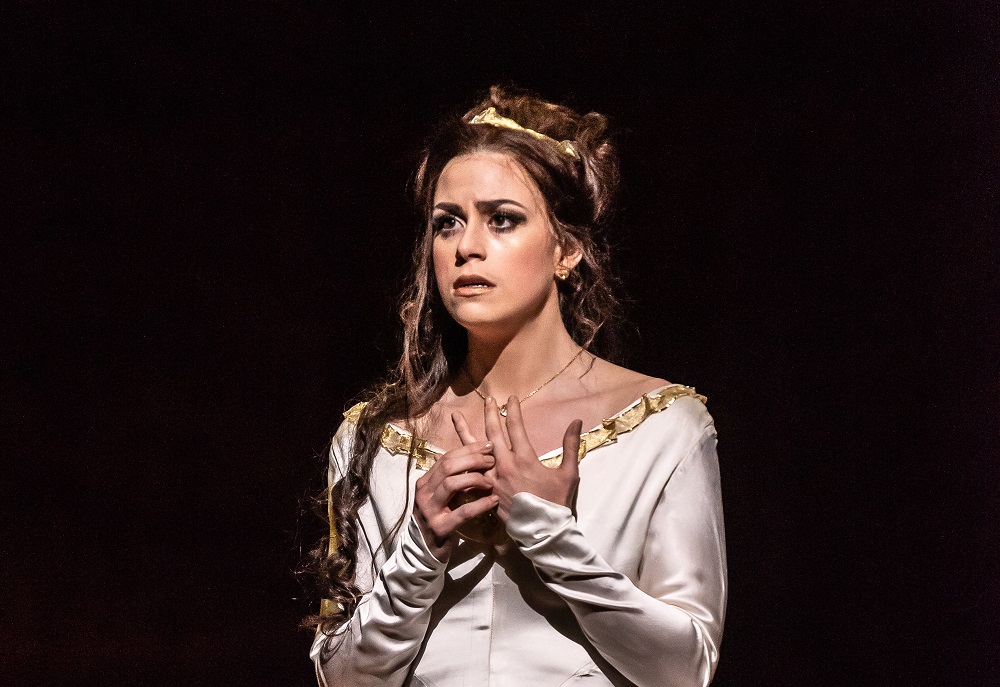 There was promise, too, in the smoky chest voice of Sarah-Jane Lewis's Ariadne, though the top will need sorting before she makes an international career. On a day that also reminded us of the wonders of 40 years of BBC Young Musician at the Proms, and not long after JPYAP soprano Jennifer Davis made her name as Elsa in the Royal Opera Lohengrin, the long-term support of young artists' programmes like this struck as more indispensible than ever. As those two watershed occasions demonstrated, it's the post-training support system which really counts.
There was promise, too, in the smoky chest voice of Sarah-Jane Lewis's Ariadne, though the top will need sorting before she makes an international career. On a day that also reminded us of the wonders of 40 years of BBC Young Musician at the Proms, and not long after JPYAP soprano Jennifer Davis made her name as Elsa in the Royal Opera Lohengrin, the long-term support of young artists' programmes like this struck as more indispensible than ever. As those two watershed occasions demonstrated, it's the post-training support system which really counts.

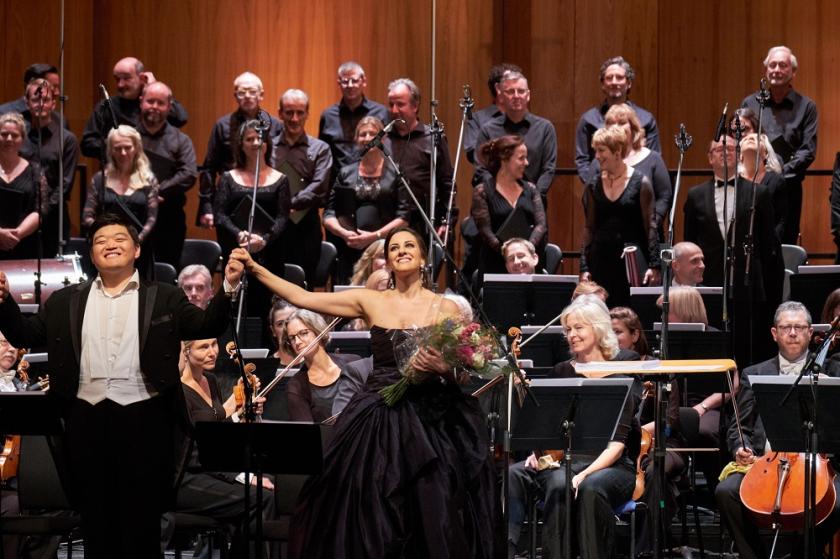












Add comment